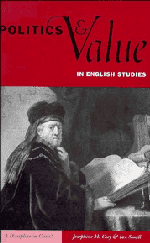5 - Value in text-editing
Published online by Cambridge University Press: 27 January 2010
Summary
Generally speaking, text-editors have had a low profile in English, especially in the recent debates about the future of the discipline. It is not simply that the ideas of textual scholarship and the interests of text-editors have been overlooked, although doubtless this has been the case; rather the work which editors do, and more importantly, the theoretical insights which their work has generated, have not generally been seen as relevant to the status of the discipline. However, logically speaking, text-criticism should enjoy a massive authority in English studies because the issues it addresses are fundamental. Why do we edit texts at all; why do we edit the texts which we do edit; and, how do we edit those texts? All of these questions implicate, in different ways and to varying degrees, the contested concepts which we have discussed in the previous chapters, those of literary value and literary identity, authority and canonicity. In other words, as Hershel Parker has pointed out, text-editing, far from being marginal to English studies, forces us to confront the central problems in the discipline.
It is broadly agreed that we need standard editions of works. However this agreement seems to rest on an assumption that text-editing and literary criticism are two distinct activities. So while there may be objections to attempts by literary critics to establish a simple authoritative reading of a text, there is rarely any unease about the principle of establishing a single authoritative text. (There are of course many specific objections to editorial decisions about specific works.)
- Type
- Chapter
- Information
- Politics and Value in English StudiesA Discipline in Crisis?, pp. 135 - 155Publisher: Cambridge University PressPrint publication year: 1993



